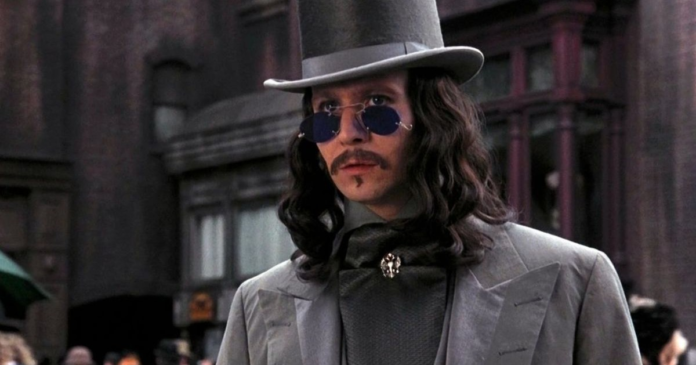The vampire movie subgenre is vast, entertaining, and beautifully bloody. This August sees another film enter into the vampire movie subgenre with The Last Voyage of the Demeter. The horror movie, directed by André Øvredal, follows a simple premise: Dracula on a boat. Starring Javier Botet, Aisling Franciosi, Corey Hawkins, and David Dastmalchian, follows the crew of the merchant ship Demeter as Dracula, the king of vampires, wreaks havoc on the ship.
The Last Voyage of the Demeter brings Dracula to the big screen in violent fashion, playing upon the horror of the unholy creature. While horror seems a natural genre for blood-sucking undead creatures known to prey on humans, the subgenre of vampire movies contains everything from dramas to teenage romance stories to full-blown comedies. If you liked Demeter, check out these five great vampire movies from both the recent and distant past.
Recommended Videos
Interview With The Vampire (1994)
Based on Anne Rice’s novel of the same name, Interview With the Vampire is an atmospheric and moody drama from director Neil Jordan. The film stars Brad Pitt and Tom Cruise as vampires Louis and Lestat, respectively, and follows the story of how Louis was turned into a vampire by Lestat in 1791. Narratively, the movie is entirely framed within the story of a present-day interview in which Louis is being interviewed by a San Francisco Chronicle reporter Daniel Malloy (Christian Slater).
Anne Rice’s Vampire Chronicles are beloved pieces of American fiction, and Jordan’s Interview With the Vampire effectively captures Rice’s cinematic writing. With a gothic feel and morose mood, the film is a complex and curious story of vampires and love. Some of the casting choices are undoubtedly dubious, but Interview With the Vampire is still a vampire movie well worth a watch.
From Dusk Till Dawn (1996)
If you are reading this and have not seen From Dusk Till Dawn, I urge you to stop reading and watch it blind. All that one needs to know about 1996’s From Dusk Till Dawn is that it’s directed by Robert Rodriguez, written by Quentin Tarantino, and stars George Clooney and Tarantino himself. It’s about two criminal brothers who take a family hostage in order to cross into Mexico, but the movie really takes a turn once they take refuge in a bar.
The rest has to be seen to be believed.
From Dusk Till Dawn is a campy, hyper-violent action-horror flick that executes one of the greatest genre twists in cinematic history. It’s not a deep rumination on big topics. Instead, it’s a hilariously absurd and astonishingly violent film that will leave your mouth agape. The film strikes a very specific chord of hilarity that fans of Tarantino or Rodriguez will likely welcome. It’s not a movie for everyone, but it’s an outstandingly good time for any audience member that doesn’t mind some empty-headed absurdity.
Bram Stoker’s Dracula (1992)
Francis Ford Coppola’s Bram Stoker’s Dracula is a wild, complicated, oddly sexy vampire movie that investigated a different side of Dracula. A refreshingly sumptuous film filled to the brim with great performances, stunning use of color, and outstanding costume design, Bram Stoker’s Dracula is a loose adaptation of Bram Stoker’s 1897 novel.
The film follows a lonely Count Dracula, played by Gary Oldman, as he tries to seduce a woman named Mina Murray, inflicting havoc in a new land. Starring such big names as Winona Ryder, Keanu Reeves (not yet a beloved action movie star), Anthony Hopkins, and Monica Bellucci, Bram Stoker’s Dracula features some truly fantastic performances. The movie has been criticized in the past — especially in regard to Reeves’ performance and a general sense of overblown extravagance — but there is no doubt that Coppola’s vision is a fully realized and unique vision of vampires from one of Hollywood’s greatest auteurs.
What We Do In The Shadows (2014)
Making a mockumentary about a group of vampires is an odd take on the creature feature, yet 2014’s What We Do In The Shadows is a rousing comedy sure to dish out barrels of laughs. Taika Waititi and Jermaine Clement co-directed What We Do In The Shadows, and the film is a great example of the duo’s silly and somewhat childish comedic flair.
What We Do In The Shadows is not like many other vampire movies out there, but it embraces its differences wholeheartedly. The entire movie is predicated on the idea that vampires are “just like us” in trying to get through their day, and it’s those every day, light-hearted moments that really set the movie apart. In a subgenre that may oftentimes feel campy and repetitive, What We Do In The Shadows is a lovely inversion. It also inspired FX’s TV show of the same name, which is consistently one of the best comedies in today’s television landscape.
Nosferatu (1922)
The godfather of all vampire movies, F.W. Murnau’s Nosferatu is a classic. Released in 1922, the film has since become recognized as one of the most influential horror movies ever made. It follows the story of Count Orlok, a vampire from Transylvania whose feelings for a real estate agent’s wife lead to tragedy. The movie is an unauthorized adaptation of Bram Stoker’s 1897 novel Dracula, the same novel that inspired Francis Ford Coppola’s Bram Stoker’s Dracula.
Even though Murnau’s masterpiece of horror cinema is over 100 years old, it’s more than just an influential timepiece. The film’s use of light, shadow, contrast, and general eeriness still scares to this day. Nosferatu functions simultaneously as an interesting, historical piece of German Expressionist cinema while also being a knock-out horror. Vampire cinema has come a long way since Nosferatu, but it’s hard to underestimate the film’s impact.
Editors’ Recommendations


